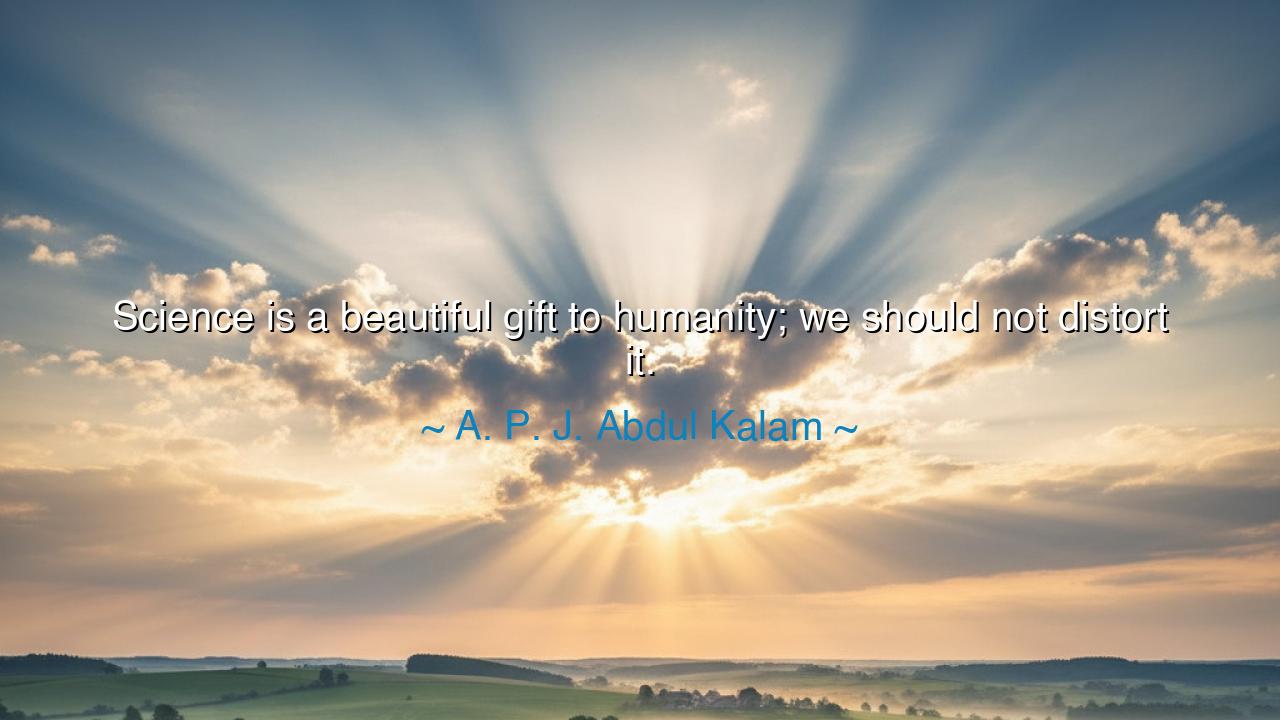
Science is a beautiful gift to humanity; we should not distort






"Science is a beautiful gift to humanity; we should not distort it." These words, spoken by the wise and revered A. P. J. Abdul Kalam, echo with a deep reverence for the gift that science truly is—a tool for understanding, creation, and progress. In his statement, Kalam reminds us that science is not merely a collection of facts or a means of achieving technological marvels, but a profound gift that has the power to illuminate the deepest mysteries of the universe and to improve the lives of all people. However, he also warns that this gift can be easily distorted, misused for selfish gain or destructive purposes. The balance between using science for the betterment of humanity and using it for harm is one that has been tested throughout history, and it is up to us, as stewards of this powerful force, to ensure it is wielded with wisdom and integrity.
In the ancient world, the great minds understood that knowledge was both a privilege and a responsibility. Aristotle, whose teachings laid the foundation for much of Western science, emphasized the need for virtue in the pursuit of knowledge. To seek knowledge without wisdom, without a sense of moral responsibility, was, in his view, a dangerous endeavor. The ancient Greeks believed that knowledge and ethics must go hand in hand, for the power to understand the natural world also carries the potential for great harm. This ancient wisdom rings true even today, as science continues to grow in its scope and influence, offering us both the ability to heal and to destroy. Kalam’s words remind us that, like the ancients, we must approach science with both reverence and caution, ensuring that its potential is harnessed for the greater good.
Consider, for a moment, the invention of the atomic bomb—a product of the greatest scientific minds of the 20th century. In the hands of J. Robert Oppenheimer and other physicists, science unlocked the unimaginable power of nuclear energy. But with this discovery came the potential for destruction on an unprecedented scale. The use of the bomb in Hiroshima and Nagasaki in 1945 stands as a stark reminder of the dangerous potential of science when it is distorted by fear, hatred, or the thirst for power. The gift of scientific understanding, when used wisely, can lead to progress and peace, but when used recklessly, it can bring devastation. This duality of science’s power is what Kalam calls us to recognize—science is beautiful, but its beauty lies in how it is used, not in the tools it provides.
In contrast, consider the example of Marie Curie, whose scientific work in radioactivity revolutionized the fields of medicine and physics. Her discoveries, though initially surrounded by dangerous unknowns, were used for the betterment of humanity. Curie dedicated her life to science, using her understanding of radioactive elements to develop treatments for cancer and other diseases. Yet, Curie’s story is also one of sacrifice and humility, for she did not seek fame or wealth, but instead focused on the potential of science to heal and to serve. She is an example of how science, when guided by a noble purpose, can become a beautiful gift to humanity—one that transcends individual glory and contributes to the well-being of all.
Kalam's warning is also a reflection of the moral dilemmas that come with the growing power of technology in the modern world. As we continue to make strides in fields like genetic engineering, artificial intelligence, and space exploration, the question arises: how will we use these gifts? The ethical implications of scientific discoveries today are as profound as they were in the past. The advent of gene editing tools like CRISPR, for example, has the potential to cure genetic diseases and improve the quality of life for countless individuals. Yet, it also raises questions about the limits of human intervention in nature. Should we use science to reshape human evolution, or does such power carry dangers that we cannot foresee? Kalam’s words are a call to carefully consider how we use the gifts of science, to recognize that the purpose of science should always be aligned with the well-being of all people, not the pursuit of power, wealth, or control.
The lesson from Kalam’s quote is simple yet profound: science is a gift, one that has the potential to elevate humanity, but also the potential to cause great harm if misused. The path forward is one of wisdom, humility, and a deep commitment to the common good. As we stand at the precipice of further scientific and technological breakthroughs, we must remember that science alone cannot guide us—it must be guided by ethics, by compassion, and by a sense of responsibility to all living beings. It is up to each generation to decide how they will wield the power of science, ensuring that it is always used to serve humanity, to create a better world, and to foster peace rather than conflict.
In your own life, reflect on how you engage with science and the technologies around you. Do you approach them with the same reverence that Kalam calls for? Are you aware of the ethical implications of your own actions, whether in business, education, or in your personal choices? Let science be a guide, but let it be guided by your moral compass, by the desire to improve the world for future generations. Science is a beautiful gift—one that can open doors to boundless progress, but only if we are wise enough to wield it with care and integrity.






AAdministratorAdministrator
Welcome, honored guests. Please leave a comment, we will respond soon